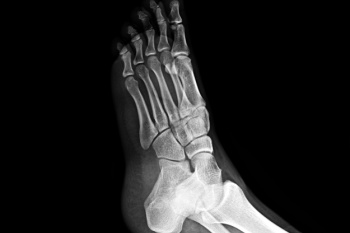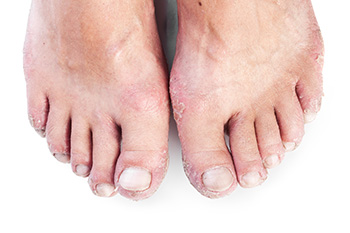Conéctate con nosotros
Blog
Items filtered by date: Julio 2024
What Is a Metatarsal Stress Fracture?

A metatarsal stress fracture is a tiny crack in one of the long bones of the foot, often caused by repetitive stress or overuse during activities like running or jumping. Symptoms include localized pain, swelling, and tenderness that worsens with activity. Preventing metatarsal stress fractures involves gradually increasing activity levels, wearing supportive footwear, and incorporating rest days into your exercise routine. Proper warm-up and stretching before activities can also reduce the risk. Treatment typically includes rest, icing the affected area, and using orthotics or supportive footwear to relieve pressure on the foot. In severe cases, immobilization with a cast or walking boot may be necessary. A podiatrist can conduct a thorough evaluation, possibly using imaging studies, and recommend appropriate treatments to promote healing and prevent further injury. Early intervention can speed up recovery and prevent long-term complications. If you suspect a metatarsal stress fracture or experience persistent foot pain, it is suggested that you make an appointment with a podiatrist.
Foot Pain
Foot pain can be extremely painful and debilitating. If you have a foot pain, consult with Arthur Segall, Jr., DPM from Segall Foot and Ankle. Our doctor will assess your condition and provide you with quality foot and ankle treatment.
Causes
Foot pain is a very broad condition that could be caused by one or more ailments. The most common include:
- Bunions
- Hammertoes
- Plantar Fasciitis
- Bone Spurs
- Corns
- Tarsal Tunnel Syndrome
- Ingrown Toenails
- Arthritis (such as Gout, Rheumatoid, and Osteoarthritis)
- Flat Feet
- Injury (from stress fractures, broken toe, foot, ankle, Achilles tendon ruptures, and sprains)
- And more
Diagnosis
To figure out the cause of foot pain, podiatrists utilize several different methods. This can range from simple visual inspections and sensation tests to X-rays and MRI scans. Prior medical history, family medical history, and any recent physical traumatic events will all be taken into consideration for a proper diagnosis.
Treatment
Treatment depends upon the cause of the foot pain. Whether it is resting, staying off the foot, or having surgery; podiatrists have a number of treatment options available for foot pain.
If you have any questions, please feel free to contact our office located in Plantation, FL . We offer the newest diagnostic and treatment technologies for all your foot care needs.
How Psoriatic Arthritis Affects the Feet
 Psoriatic arthritis, or PsA, can significantly affect the feet, leading to symptoms like swelling, soreness, and stiffness. Walking or standing for prolonged periods may become uncomfortable, and shoes might feel tight due to swelling. Common issues resulting from psoriatic arthritis can include swelling of the ankle and big toe, plantar fasciitis, and pain in the Achilles tendon. Symptoms can fluctuate, so it is important to monitor and address them early. This can help to prevent long-term problems, such as an elongated big toe and stiff toe joints. A podiatrist can play a key role in managing symptoms of psoriatic arthritis by providing a treatment plan, which may include specific exercises and stretches that protect and maintain joint flexibility. A podiatrist also can recommend proper footwear and prescribe custom shoe orthotics to relieve pressure and offer stability. If you are experiencing foot pain resulting from psoriatic arthritis, it is suggested that you schedule an appointment with a podiatrist for an exam, diagnosis, and treatment options.
Psoriatic arthritis, or PsA, can significantly affect the feet, leading to symptoms like swelling, soreness, and stiffness. Walking or standing for prolonged periods may become uncomfortable, and shoes might feel tight due to swelling. Common issues resulting from psoriatic arthritis can include swelling of the ankle and big toe, plantar fasciitis, and pain in the Achilles tendon. Symptoms can fluctuate, so it is important to monitor and address them early. This can help to prevent long-term problems, such as an elongated big toe and stiff toe joints. A podiatrist can play a key role in managing symptoms of psoriatic arthritis by providing a treatment plan, which may include specific exercises and stretches that protect and maintain joint flexibility. A podiatrist also can recommend proper footwear and prescribe custom shoe orthotics to relieve pressure and offer stability. If you are experiencing foot pain resulting from psoriatic arthritis, it is suggested that you schedule an appointment with a podiatrist for an exam, diagnosis, and treatment options.
Arthritis can be a difficult condition to live with. If you are seeking treatment, contact Arthur Segall, Jr., DPM from Segall Foot and Ankle. Our doctor can provide the care you need to keep you pain-free and on your feet.
Arthritic Foot Care
Arthritis is a term that is commonly used to describe joint pain. The condition itself can occur to anyone of any age, race, or gender, and there are over 100 types of it. Nevertheless, arthritis is more commonly found in women compared to men, and it is also more prevalent in those who are overweight. The causes of arthritis vary depending on which type of arthritis you have. Osteoarthritis for example, is often caused by injury, while rheumatoid arthritis is caused by a misdirected immune system.
Symptoms
- Swelling
- Pain
- Stiffness
- Decreased Range of Motion
Arthritic symptoms range in severity, and they may come and go. Some symptoms stay the same for several years but could potentially get worse with time. Severe cases of arthritis can prevent its sufferers from performing daily activities and make walking difficult.
Risk Factors
- Occupation – Occupations requiring repetitive knee movements have been linked to osteoarthritis
- Obesity – Excess weight can contribute to osteoarthritis development
- Infection – Microbial agents can infect the joints and trigger arthritis
- Joint Injuries – Damage to joints may lead to osteoarthritis
- Age – Risk increases with age
- Gender –Most types are more common in women
- Genetics – Arthritis can be hereditary
If you suspect your arthritis is affecting your feet, it is crucial that you see a podiatrist immediately. Your doctor will be able to address your specific case and help you decide which treatment method is best for you.
If you have any questions, please feel free to contact our office located in Plantation, FL . We offer the newest diagnostic and treatment technologies for all your foot care needs.
Understanding Toenail Fungus

Toenail fungus, or onychomycosis, is a common condition where a fungal infection affects the toenails, causing them to become discolored, thickened, and brittle. This happens when fungi, including dermatophytes, yeasts, or molds, infiltrate the nail bed through cracks or cuts. Warm, moist environments, such as sweaty shoes or public showers, are ideal for fungal growth, making these areas common sources of infection. Poor foot hygiene, compromised immune systems, and conditions like diabetes can increase the risk. Preventing toenail fungus involves keeping feet clean and dry, wearing breathable footwear, and avoiding walking barefoot in communal areas. Regularly trimming nails and avoiding shared nail care tools can also help to reduce the risk of infection. Toenail fungus can be uncomfortable and unsightly. If you have developed this condition, it is suggested that you visit a podiatrist who can offer you prescribed medication for a full recovery.
For more information about treatment, contact Arthur Segall, Jr., DPM of Segall Foot and Ankle. Our doctor can provide the care you need to keep you pain-free and on your feet.
Toenail Fungus Treatment
Toenail fungus is a condition that affects many people and can be especially hard to get rid of. Fortunately, there are several methods to go about treating and avoiding it.
Antifungals & Deterrence
Oral antifungal medicine has been shown to be effective in many cases. It is important to consult with a podiatrist to determine the proper regiment for you, or potentially explore other options.
Applying foot powder on the feet and shoes helps keep the feet free of moisture and sweat.
Sandals or open toed shoes – Wearing these will allow air movement and help keep feet dry. They also expose your feet to light, which fungus cannot tolerate. Socks with moisture wicking material also help as well.
If you have any questions please feel free to contact our office located in Plantation, FL . We offer the newest diagnostic tools and technology to treat your foot and ankle needs.
Heel Pain in the Morning?
Gout and Bunion Confusion
 Gout and bunions are distinct foot conditions that can sometimes be confused due to similar symptoms of pain and swelling in the big toe area. Gout is a form of inflammatory arthritis caused by the accumulation of uric acid crystals in the joint, leading to sudden, severe pain, redness, and swelling. It often affects the big toe but can occur in other joints. Bunions are structural deformities where the big toe deviates toward the other toes, causing a bony bump on the side of the foot. This can result from wearing tight shoes, genetic factors, or arthritis. Bunions can cause chronic pain, especially while walking or wearing shoes, and can lead to swelling and redness. To manage gout, lifestyle changes such as reducing alcohol and purine-rich foods, staying hydrated, and taking medications to lower uric acid levels are recommended. Bunions may be managed with properly fitting shoes, orthotics, and, in severe cases, surgery. If you have toe pain, it is suggested that you schedule an appointment with a podiatrist for an accurate diagnosis and appropriate treatment plan for either condition.
Gout and bunions are distinct foot conditions that can sometimes be confused due to similar symptoms of pain and swelling in the big toe area. Gout is a form of inflammatory arthritis caused by the accumulation of uric acid crystals in the joint, leading to sudden, severe pain, redness, and swelling. It often affects the big toe but can occur in other joints. Bunions are structural deformities where the big toe deviates toward the other toes, causing a bony bump on the side of the foot. This can result from wearing tight shoes, genetic factors, or arthritis. Bunions can cause chronic pain, especially while walking or wearing shoes, and can lead to swelling and redness. To manage gout, lifestyle changes such as reducing alcohol and purine-rich foods, staying hydrated, and taking medications to lower uric acid levels are recommended. Bunions may be managed with properly fitting shoes, orthotics, and, in severe cases, surgery. If you have toe pain, it is suggested that you schedule an appointment with a podiatrist for an accurate diagnosis and appropriate treatment plan for either condition.
Gout is a painful condition that can be treated. If you are seeking treatment, contact Arthur Segall, Jr., DPM from Segall Foot and Ankle. Our doctor will treat your foot and ankle needs.
What Is Gout?
Gout is a form of arthritis that is characterized by sudden, severe attacks of pain, redness, and tenderness in the joints. The condition usually affects the joint at the base of the big toe. A gout attack can occur at any random time, such as the middle of the night while you are asleep.
Symptoms
- Intense Joint Pain - Usually around the large joint of your big toe, and it most severe within the first four to twelve hours
- Lingering Discomfort - Joint discomfort may last from a few days to a few weeks
- Inflammation and Redness -Affected joints may become swollen, tender, warm and red
- Limited Range of Motion - May experience a decrease in joint mobility
Risk Factors
- Genetics - If family members have gout, you’re more likely to have it
- Medications - Diuretic medications can raise uric acid levels
- Gender/Age - Gout is more common in men until the age of 60. It is believed that estrogen protects women until that point
- Diet - Eating red meat and shellfish increases your risk
- Alcohol - Having more than two alcoholic drinks per day increases your risk
- Obesity - Obese people are at a higher risk for gout
Prior to visiting your podiatrist to receive treatment for gout, there are a few things you should do beforehand. If you have gout you should write down your symptoms--including when they started and how often you experience them, important medical information you may have, and any questions you may have. Writing down these three things will help your podiatrist in assessing your specific situation so that he or she may provide the best route of treatment for you.
If you have any questions, please feel free to contact our office located in Plantation, FL . We offer the newest diagnostic and treatment technologies for all your foot care needs.
Potential Foot Ailments During Pregnancy

Pregnancy brings numerous changes to a woman's body, often leading to foot problems. One of the most common issues is flat feet, or overpronation, where increased body weight causes the foot arch to flatten and the feet to roll inward. This can result in pain and additional strain on the feet, calves, and back. Wearing supportive footwear and using orthotics can help alleviate this discomfort. Swelling, or edema, typical in the second or third trimester, results from increased blood volume and pressure, leading to water retention in the legs and feet. Regular movement, elevating the feet, staying hydrated, and reducing salt intake can help reduce swelling. Pregnant women are also prone to developing ingrown toenails due to changes in foot size and shape, often worsened by tighter shoes. Soaking feet in salt water and having toenails properly trimmed can offer relief. Additionally, some women experience hot or burning sensations in their feet due to hormonal changes and increased body temperature. Cracked heels might develop from the added weight and posture changes that cause dry skin and heel expansion. Moisturizing and wearing comfortable shoes can prevent and treat these cracks. If you are experiencing foot pain during pregnancy, it is suggested that you schedule an appointment with a podiatrist for an exam and appropriate treatment.
Pregnant women with swollen feet can be treated with a variety of different methods that are readily available. For more information about other cures for swollen feet during pregnancy, consult with Arthur Segall, Jr., DPM from Segall Foot and Ankle. Our doctor will attend to all of your foot and ankle needs.
What Foot Problems Can Arise During Pregnancy?
One problem that can occur is overpronation, which occurs when the arch of the foot flattens and tends to roll inward. This can cause pain and discomfort in your heels while you’re walking or even just standing up, trying to support your baby.
Another problem is edema, or swelling in the extremities. This often affects the feet during pregnancy but tends to occur in the later stages.
How Can I Keep My Feet Healthy During Pregnancy?
- Wearing orthotics can provide extra support for the feet and help distribute weight evenly
- Minimize the amount of time spent walking barefoot
- Wear shoes with good arch support
- Wear shoes that allow for good circulation to the feet
- Elevate feet if you experience swelling
- Massage your feet
- Get regular, light exercise, such as walking, to promote blood circulation to the feet
If you have any questions please feel free to contact our offices located in Plantation, FL Ft. Lauderdale, F . We offer the newest diagnostic and treatment technologies for all your foot and ankle needs.

